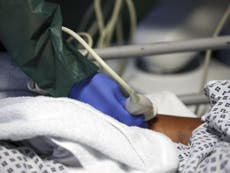Two babies have died in a prison cell as women in jail are refused basic medical care
The Prisons and Probation Ombudsman will now have to consider the appalling prospect of whether a baby who could have survived has died in utero due to gross negligence

Eight months ago, a baby girl was born and died in a cell at Bronzefield prison. Unforgivably, her mother was unattended when she gave birth. The resulting trauma will last that woman's entire lifetime.
Now another baby has been born pre-term and dead at Styal prison, after a woman complained for days of severe pain and was reportedly refused medical care until it was beyond question she was about to deliver. Instead, she was told to take paracetamol. This woman was not known to be pregnant, but the question remains: why was someone in agony, frightened and begging for a doctor not taken straight to the prison infirmary to be checked over?
To anyone on the outside, this would be the obvious course of action, but prison is a different country; they do things differently there. In recent years, access to medical attention for people in prison has been repeatedly blasted by MPs, charities and academics. In 2018, Parliament’s health and social care committee said: “A prison sentence is a deprivation of someone's liberty, not a sentence to poorer health or healthcare."
Women’s health needs are repeatedly ignored when they are incarcerated. And this can be life-threatening. A Nuffield report published this year highlighted a dangerous "last minute" approach to healthcare for pregnant prisoners, saying that more than one in 10 pregnant inmates gave birth either in prison or on their way to hospital “which points to wider problems meeting the health care needs of pregnant women in prison.”
In recent research carried out by Lucy Baldwin, a senior lecturer in criminology at De Montfort university, and Dr Rona Epstein of Coventry Law School, one woman miscarried her baby at four months gestation after reporting bleeding while on her own in her cell "for hours" and being ignored: “I was terrified, and the prison said they would get me to the doctors in the morning,” she told the researchers. “I was in so much pain they called an ambulance eventually.” She lost her baby on the way to the hospital, in handcuffs.
Pregnancy and birth is not the only reported violation of women's rights to medical care in prison. Other women said they had been denied their prescribed hormone replacement therapy on admittance to prison, with serious consequences for their mood and ability to cope with a highly stressful situation. Many others reported that they had not been given their prescribed antidepressant: coming off antidepressants suddenly is well known to be risky, and can have tragic consequences – one woman said she had felt suicidal for the very first time.
Healthcare is a basic human right. It should not take the obscene repetition of deaths of babies born in prison cells for government to take female inmates’ health needs seriously. But it seems that this lowest of low points is where we are at.
The baby who was stillborn at Styal prison had an estimated gestation of 24 weeks. Women routinely encounter difficulties in pregnancy: with expert care, they can be treated so an unborn baby has crucial extra days and weeks in which to develop. In the days between this mother pleading for medical care and delivering her dead child, it is within the bounds of possibility that her pregnancy might have been saved. Instead, by ignoring her pleas for help, any chance of survival that baby might have had was unforgivably squandered.
The Prisons and Probation Ombudsman will now have to consider the appalling prospect of whether a baby who could have survived, has died in utero due to gross negligence by HM Prison Service.
With this second infant death in prison in less than a year, perhaps prison governors will now see fit to drive a change in the culture whereby prisoners’ health needs are routinely minimised and ignored. And maybe the Ministry of Justice will feel sufficiently ashamed to reconsider whether women should be incarcerated on short sentences at all.
Because no matter what they have done, every inmate should be safe in prison, and their babies should not be dying there.







Join our commenting forum
Join thought-provoking conversations, follow other Independent readers and see their replies